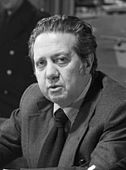Portuguese legislative election, 1983
|
|
|||||||||||||||||||||||||||||||||||||
|---|---|---|---|---|---|---|---|---|---|---|---|---|---|---|---|---|---|---|---|---|---|---|---|---|---|---|---|---|---|---|---|---|---|---|---|---|---|
|
|||||||||||||||||||||||||||||||||||||
|
250 seats to the Portuguese Assembly 125 seats needed for a majority |
|||||||||||||||||||||||||||||||||||||
|
|||||||||||||||||||||||||||||||||||||

The first and the second most voted parties in each district
(Azores and Madeira are not shown) |
|||||||||||||||||||||||||||||||||||||
|
|||||||||||||||||||||||||||||||||||||
| Portugal |
 This article is part of the series: |
This article is part of the series:
Politics and government of
Portugal
The Portuguese legislative election of 1983 took place on 25 April. The last election, in October 1980 had been won by a right-wing coalition, the Democratic Alliance and Francisco Sá Carneiro had retained office as Prime Minister with an increased majority. However, Sá Carneiro, along with other important members of the coalition, died in an aircrash only two months after the election, on 5 December 1980. Such happenings caused a massive political instability and Francisco Pinto Balsemão, a senior official of the Social Democratic Party, the largest party in the Alliance, became Prime Minister. But Balsemão lacked support from such senior members of his party as Aníbal Cavaco Silva, and several ministers resigned. Moreover, the right-wing policy was criticized by the left-wing and by the trade unions, and in February, the General Confederation of the Portuguese Workers, with the support of the Communists, called for a general strike that shook the government. The wave of resignations among Balsemão's ministers continued and by the end of the year, he also resigned. Because no one inside the Social Democratic Party accepted the office of Prime Minister, the President Ramalho Eanes dissolved the Parliament and called an election for April.
...
Wikipedia


